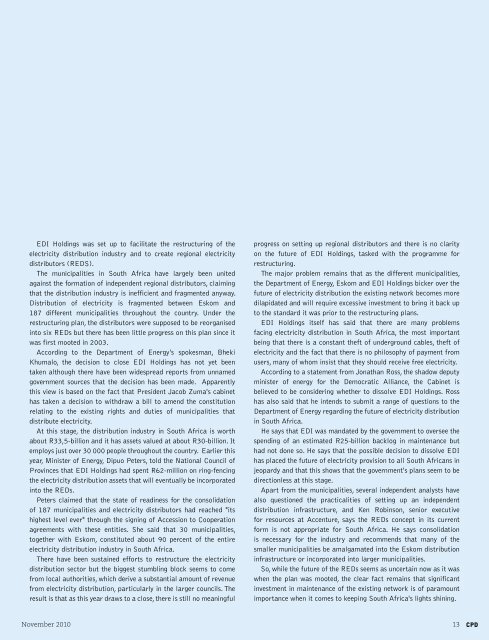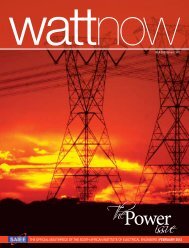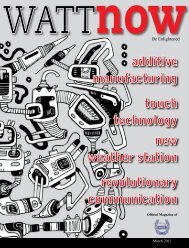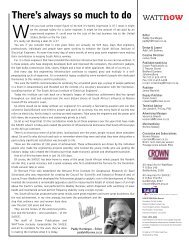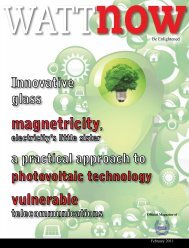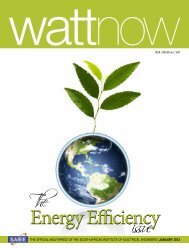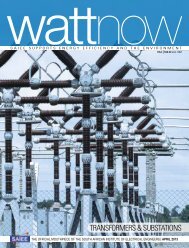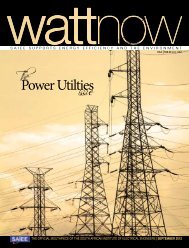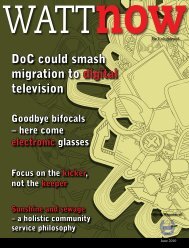download a PDF of the full November 2010 issue - Wattnow
download a PDF of the full November 2010 issue - Wattnow
download a PDF of the full November 2010 issue - Wattnow
You also want an ePaper? Increase the reach of your titles
YUMPU automatically turns print PDFs into web optimized ePapers that Google loves.
EDI Holdings was set up to facilitate <strong>the</strong> restructuring <strong>of</strong> <strong>the</strong><br />
electricity distribution industry and to create regional electricity<br />
distributors (REDS).<br />
The municipalities in South Africa have largely been united<br />
against <strong>the</strong> formation <strong>of</strong> independent regional distributors, claiming<br />
that <strong>the</strong> distribution industry is inefficient and fragmented anyway.<br />
Distribution <strong>of</strong> electricity is fragmented between Eskom and<br />
187 different municipalities throughout <strong>the</strong> country. Under <strong>the</strong><br />
restructuring plan, <strong>the</strong> distributors were supposed to be reorganised<br />
into six REDs but <strong>the</strong>re has been little progress on this plan since it<br />
was first mooted in 2003.<br />
According to <strong>the</strong> Department <strong>of</strong> Energy's spokesman, Bheki<br />
Khumalo, <strong>the</strong> decision to close EDI Holdings has not yet been<br />
taken although <strong>the</strong>re have been widespread reports from unnamed<br />
government sources that <strong>the</strong> decision has been made. Apparently<br />
this view is based on <strong>the</strong> fact that President Jacob Zuma's cabinet<br />
has taken a decision to withdraw a bill to amend <strong>the</strong> constitution<br />
relating to <strong>the</strong> existing rights and duties <strong>of</strong> municipalities that<br />
distribute electricity.<br />
At this stage, <strong>the</strong> distribution industry in South Africa is worth<br />
about R33,5-billion and it has assets valued at about R30-billion. It<br />
employs just over 30 000 people throughout <strong>the</strong> country. Earlier this<br />
year, Minister <strong>of</strong> Energy, Dipuo Peters, told <strong>the</strong> National Council <strong>of</strong><br />
Provinces that EDI Holdings had spent R62-million on ring-fencing<br />
<strong>the</strong> electricity distribution assets that will eventually be incorporated<br />
into <strong>the</strong> REDs.<br />
Peters claimed that <strong>the</strong> state <strong>of</strong> readiness for <strong>the</strong> consolidation<br />
<strong>of</strong> 187 municipalities and electricity distributors had reached "its<br />
highest level ever" through <strong>the</strong> signing <strong>of</strong> Accession to Cooperation<br />
agreements with <strong>the</strong>se entities. She said that 30 municipalities,<br />
toge<strong>the</strong>r with Eskom, constituted about 90 percent <strong>of</strong> <strong>the</strong> entire<br />
electricity distribution industry in South Africa.<br />
There have been sustained efforts to restructure <strong>the</strong> electricity<br />
distribution sector but <strong>the</strong> biggest stumbling block seems to come<br />
from local authorities, which derive a substantial amount <strong>of</strong> revenue<br />
from electricity distribution, particularly in <strong>the</strong> larger councils. The<br />
result is that as this year draws to a close, <strong>the</strong>re is still no meaningful<br />
progress on setting up regional distributors and <strong>the</strong>re is no clarity<br />
on <strong>the</strong> future <strong>of</strong> EDI Holdings, tasked with <strong>the</strong> programme for<br />
restructuring.<br />
The major problem remains that as <strong>the</strong> different municipalities,<br />
<strong>the</strong> Department <strong>of</strong> Energy, Eskom and EDI Holdings bicker over <strong>the</strong><br />
future <strong>of</strong> electricity distribution <strong>the</strong> existing network becomes more<br />
dilapidated and will require excessive investment to bring it back up<br />
to <strong>the</strong> standard it was prior to <strong>the</strong> restructuring plans.<br />
EDI Holdings itself has said that <strong>the</strong>re are many problems<br />
facing electricity distribution in South Africa, <strong>the</strong> most important<br />
being that <strong>the</strong>re is a constant <strong>the</strong>ft <strong>of</strong> underground cables, <strong>the</strong>ft <strong>of</strong><br />
electricity and <strong>the</strong> fact that <strong>the</strong>re is no philosophy <strong>of</strong> payment from<br />
users, many <strong>of</strong> whom insist that <strong>the</strong>y should receive free electricity.<br />
According to a statement from Jonathan Ross, <strong>the</strong> shadow deputy<br />
minister <strong>of</strong> energy for <strong>the</strong> Democratic Alliance, <strong>the</strong> Cabinet is<br />
believed to be considering whe<strong>the</strong>r to dissolve EDI Holdings. Ross<br />
has also said that he intends to submit a range <strong>of</strong> questions to <strong>the</strong><br />
Department <strong>of</strong> Energy regarding <strong>the</strong> future <strong>of</strong> electricity distribution<br />
in South Africa.<br />
He says that EDI was mandated by <strong>the</strong> government to oversee <strong>the</strong><br />
spending <strong>of</strong> an estimated R25-billion backlog in maintenance but<br />
had not done so. He says that <strong>the</strong> possible decision to dissolve EDI<br />
has placed <strong>the</strong> future <strong>of</strong> electricity provision to all South Africans in<br />
jeopardy and that this shows that <strong>the</strong> government's plans seem to be<br />
directionless at this stage.<br />
Apart from <strong>the</strong> municipalities, several independent analysts have<br />
also questioned <strong>the</strong> practicalities <strong>of</strong> setting up an independent<br />
distribution infrastructure, and Ken Robinson, senior executive<br />
for resources at Accenture, says <strong>the</strong> REDs concept in its current<br />
form is not appropriate for South Africa. He says consolidation<br />
is necessary for <strong>the</strong> industry and recommends that many <strong>of</strong> <strong>the</strong><br />
smaller municipalities be amalgamated into <strong>the</strong> Eskom distribution<br />
infrastructure or incorporated into larger municipalities.<br />
So, while <strong>the</strong> future <strong>of</strong> <strong>the</strong> REDs seems as uncertain now as it was<br />
when <strong>the</strong> plan was mooted, <strong>the</strong> clear fact remains that significant<br />
investment in maintenance <strong>of</strong> <strong>the</strong> existing network is <strong>of</strong> paramount<br />
importance when it comes to keeping South Africa's lights shining.<br />
<strong>November</strong> <strong>2010</strong> 13


